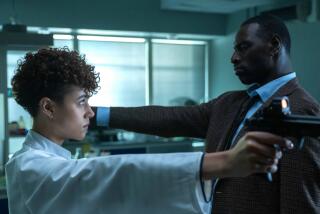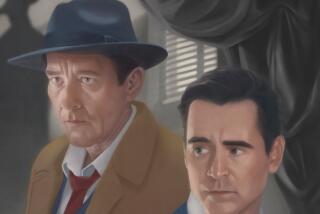He has trouble in mind
- Share via
Angelo Ledda asks for fries at a restaurant in Marseille, France, only to be told that he’s already ordered them. Momentarily confused, he turns to his luncheon companion and says maybe he’s not the right man for the job. “People like us,” his companion says with finality, “don’t retire.”
Ledda, as it happens, is a ruthless and implacable hit man, someone who would take out his own father if the job called for it. But as the fries incident suggests, Ledda, getting older and struggling with advancing Alzheimer’s, is not sure his mind will allow him to finish his assignment.
The idea of an assassin with Alzheimer’s might sound like the setup for a Monty Python routine, but “The Memory of a Killer” from Belgium is anything but a joke. Originally titled “The Alzheimer Case” and winner of five of that country’s version of the Oscars (including one for Jan Decleir, who plays Ledda), this is one terrific thriller with several wicked tricks up its sleeve, each more satisfying than the last.
Based on a Flemish novel by Jef Geeraerts, “Memory” gets much of its pizazz from co-writer (with Carl Joos) and director Erik Van Looy. He’s kept the film robustly moving, giving it a crisp, propulsive style that shows he relished the opportunity to work with such unusual material.
One of the things that makes “Memory” so effective is the sweet complexity of its plot. Far from a simple good guy-versus-bad guy story, it has numerous characters of uncertain and ever-changing moral standing. These people alternately help, hamper and frustrate one another as they attempt, for a variety of reasons, to get to the bottom of some especially dark criminal activity.
Before Ledda asks about those fries, “Memory” introduces two Belgian police officers -- Det. Chief Inspector Eric Vincke (Koen De Bouw) and his partner, Freddy Verstuyft (Werner De Smedt) -- and their investigation of child prostitution. A driven straight-arrow, Vincke is the kind of police officer who always wants to know more, to get to the higher-ups, while his partner is happy to bust whatever criminals he can. It’s a conflict that resonates throughout the film.
Although he hates Belgium (“like everybody else,” his luncheon partner responds), Ledda agrees to leave Marseille and return to his homeland for one last assignment. Wonderfully played by the veteran Decleir, Ledda turns out to be a compelling combination of coldbloodedness and fragility. We see him complete the first part of his assignment with impeccable professionalism, but also resorting (a la Christopher Nolan’s “Memento”) to writing his hotel room number on his arm. Despite his ever-present medicine, he falls into occasional fugue states and worries about how long it will be before the final curtain descends.
Then, unexpectedly, Ledda develops a moral qualm about part of his assignment, and the resulting complications make him both a target and an avenger. He becomes a classic antihero, wanting to take out the people at the top of the criminal pyramid. But, fearful that his mental state will not allow him to fulfill that quest, he attempts to prepare for that eventuality as well.
The two police officers who end up on his trail have conflicts of their own. Aside from trying to apprehend Ledda, they clash over whether to go for a quick bust (not that it would be easy) or play out the hand and see where it leads. And they also have to deal with a bitter, no-holds-barred rivalry with another law enforcement agency, the judicial police.
As detailed as all this sounds, it barely scratches the surface of “Memory of a Killer’s” complexities and twists of plot, its ability to keep you guessing and wondering. If you’ve been waiting for a crackerjack thriller, this expert film -- Belgium’s Oscar submission and one of its 10 top-grossing films of all time -- has what it takes to make you happy.
*
‘The Memory of a Killer’
MPAA rating: R for violence, sexuality and nudity
Times guidelines: Nudity, sexuality, violence, child prostitution as a plot element
Sony Pictures Classics. Director Erik Van Looy. Producers Erwin Provoost, Hilde De Laere. Screenplay Carl Joos & Erik Van Looy, based on a novel by Jef Geeraerts. Cinematographer Danny Eisen. Editor Philippe Ravoet. Costumes Kristin Van Passel. Music Stephen Warbeck. Art director Johan Van Essche. Running time: 2 hours. In Dutch with English subtitles.
In selected theaters.
More to Read
Only good movies
Get the Indie Focus newsletter, Mark Olsen's weekly guide to the world of cinema.
You may occasionally receive promotional content from the Los Angeles Times.











